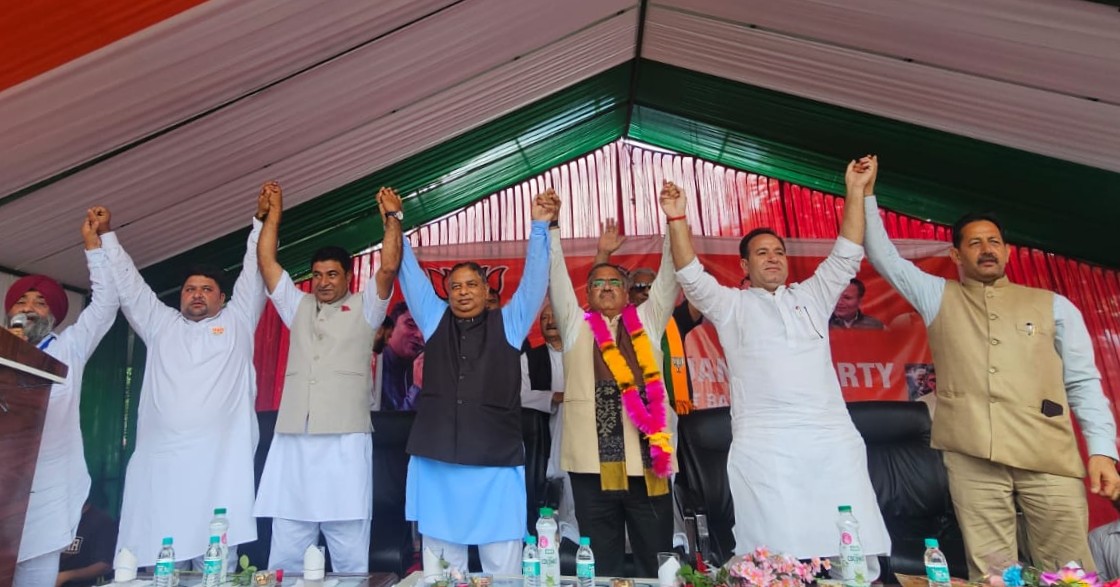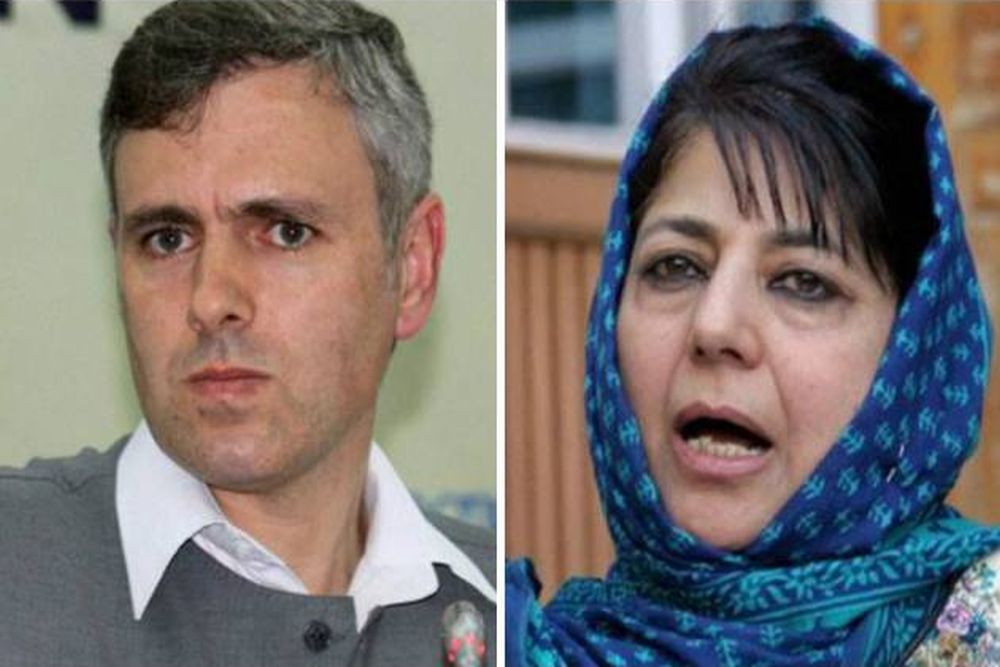BJP’s Tarun Chugh Accuses National Conference of Betraying Kashmir’s Youth | Tourism Row, LPG Promises & Voter Turnout
By: Javid Amin | 30 July 2025
Kashmir’s Political War of Words Heats Up Again
In the volatile and always politically charged landscape of Jammu & Kashmir, a fresh war of words has erupted—this time between the BJP and the National Conference (NC). At the center of this battle is Tarun Chugh, the BJP’s National General Secretary and in-charge of Jammu & Kashmir affairs, who has accused the NC leadership of betraying the youth, maligning tourism, and distorting Kashmir’s cultural identity.
This confrontation comes in the backdrop of upcoming assembly elections, increasing voter participation, peaceful religious processions, and a growing discourse about accountability, employment, and identity politics.
Let’s unpack the sharp points raised by Tarun Chugh and what they reveal about the state of Kashmiri politics in 2025.
“Fraud on the Youth and Poor” – The Broken Promises of NC
Tarun Chugh minced no words when he called out the National Conference for its failure to honor key promises made during previous election campaigns. He particularly slammed the Abdullahs for luring voters with attractive but unrealized schemes, stating:
“The promise of one lakh jobs, filling all government vacancies within 180 days, six free LPG cylinders, and 200 units of free electricity—this was not governance, this was fraud. A fraud on the youth and poor of Jammu & Kashmir.”
Let’s break down these claims:
01. One Lakh Jobs Promise
-
During the NC’s 2019 and 2020 political campaigns, leaders had repeatedly promised large-scale government employment drives.
-
As of 2025, there has been no visible implementation or even transparency about employment policies if NC were to assume power.
02. 180-Day Vacancy Filling
-
Jammu & Kashmir has thousands of pending government vacancies—from healthcare to education.
-
Critics argue that bureaucratic bottlenecks and political inertia under NC’s local governance mechanisms failed to prioritize these needs.
03. Six Free LPG Cylinders & Free Electricity
-
These were flagship welfare promises targeted at women and low-income households.
-
According to Chugh, these were populist distractions with no budgetary backing, no rollout mechanism, and no accountability framework.
This frontal attack by Chugh aims to highlight NC’s credibility crisis—particularly among young voters, who form over 65% of the population in Kashmir.
The Youth Factor – Kashmir’s Unemployed and Politically Awake Generation
Chugh’s attack is strategically aimed at Kashmir’s restless and ambitious youth. Decades of conflict, followed by governance vacuums and economic stagnation, have left tens of thousands of graduates jobless.
According to a 2024 report by the Centre for Monitoring Indian Economy (CMIE):
-
Kashmir’s youth unemployment rate stands at 25%, well above the national average.
-
Government hiring remains sporadic and opaque, while private sector growth is hampered by security perceptions and lack of infrastructure.
By branding the NC’s job-related promises as “fraudulent,” Chugh is positioning the BJP as the party of delivery, not deception—a narrative that could resonate if backed by real outcomes and sustained engagement.
Aga Rahullah’s ‘Cultural Invasion’ Comment Sparks National Backlash
Another flashpoint in Chugh’s criticism was the controversial statement by NC MP Aga Rahullah, who allegedly called the boom in tourism a “cultural invasion”. Chugh responded fiercely:
“This is nothing but Pakistan-sponsored propaganda. To call tourists—Indians—cultural invaders is an insult to Kashmir’s composite, inclusive identity.”
Rahullah’s comment is seen by many as an attempt to stoke identity anxieties, playing into the old narrative that tourism and economic integration threaten Kashmir’s unique culture and demographics.
However, Chugh turned the tables:
-
He framed tourism as a bridge, not a threat.
-
He cited examples of local employment gains in hospitality, transport, and handicrafts.
-
He accused NC of “weaponizing cultural purity” to distract from their own governance failures.
This part of the controversy taps into deeper ideological rifts—between traditionalist Kashmir-centric parties and pan-national integrationist politics.
Tourism as Hope – A Tool for Economic Transformation
Tarun Chugh emphasized that tourism is not just an economic sector—it is a symbol of normalcy, opportunity, and integration.
“When a Kashmiri youth drives a tourist cab or sells Pashmina, he’s not losing culture—he’s gaining dignity and livelihood.”
Tourism in Kashmir has seen a significant rise since 2021:
-
Over 2.1 crore tourists visited J&K in 2024, according to UT officials.
-
Employment in the tourism sector crossed 4 lakh jobs, both direct and indirect.
-
Home-stay programs and rural tourism have picked up in areas like Gurez, Kupwara, and Pulwama.
Chugh’s criticism of Rahullah’s remarks is more than political—it’s a defense of economic optimism in a valley long battered by pessimism.
“Divisive Rhetoric to Distract from Failures”
In a blistering section of his statement, Tarun Chugh accused the NC of engaging in “divisive politics” to cover up their own governance failures.
Specifically, he mentioned:
-
Silence on the peaceful Muharram procession—a religious event once banned due to security fears, now held under tight but cooperative security management.
-
No acknowledgment of high voter turnout, especially in Baramulla, Srinagar, and Anantnag, where participation rates crossed 55%—a historic high.
By staying silent on such democratic gains, Chugh argued, the NC was “unwilling to accept that peace and participation are returning to the Valley.”
This part of his critique taps into public frustration with political doublespeak, where progress is often denied or downplayed for political gain.
Historical Accountability – Rigged Elections and Democratic Betrayals?
Perhaps the most serious charge from Chugh was his reference to NC’s alleged involvement in past election rigging, particularly the 1987 assembly elections—widely seen as a turning point in Kashmir’s descent into militancy.
“The Abdullah family owes an apology to generations of Kashmiris who were robbed of their democratic voice.”
The 1987 elections, contested by a Muslim United Front (MUF) that included future separatist leaders, were marred by widespread rigging, ballot manipulation, and state repression. This disillusionment among youth, Chugh reminded, fueled the militancy that began in 1989.
While NC leaders have dismissed these allegations, they remain a sore point in public memory, especially among first- and second-generation conflict survivors.
By reviving this history, Chugh aims to paint the NC not just as ineffective, but historically complicit in the instability Kashmir has endured.
The Broader BJP Narrative – Governance, Development, and Integration
Tarun Chugh’s criticism must also be seen in light of BJP’s larger Kashmir policy narrative, which includes:
-
Post-Article 370 integration, removing special status and extending all central laws
-
Massive infrastructure projects, including new highways, tunnels, and medical colleges
-
Record-level central recruitment drives
-
Industrial investment push, with ₹28,000 crore already committed
The BJP is positioning itself as a builder of a “New Kashmir”—one that’s peaceful, prosperous, and integrated into the Indian mainstream.
Chugh’s speech reaffirms this strategy by drawing a clear contrast between promises (NC) and performance (BJP).
Will This Political Offensive Work?
With assembly elections expected in late 2025 or early 2026, Tarun Chugh’s remarks are clearly designed to set the tone for BJP’s campaign in the Valley.
However, challenges remain:
-
BJP has no mass face in Kashmir yet, though outreach is growing.
-
The party is often seen as non-representative among traditional Kashmiri Muslim constituencies.
-
Alienation among educated youth, especially post-370, remains a challenge.
Yet, if BJP can:
-
Mobilize young voters,
-
Showcase economic benefits,
-
Continue with social stability,
…then Chugh’s offensive could shape a new electoral alignment in the Valley.
Bottom-Line: A Battle Over Promises, Identity, and Aspirations
Tarun Chugh’s critique of the National Conference is more than just partisan posturing—it’s a high-stakes narrative battle over who truly represents the aspirations of modern Kashmiris.
On one side is the traditional elite, represented by the Abdullahs, accused of empty promises and cultural dog-whistles. On the other is a national party trying to rewrite the script, using development, nationalism, and economic integration.
As Kashmir prepares for its next democratic chapter, the real question is:
Will voters trust the past, or invest in a promised future? Only time—and the ballot box—will decide.



